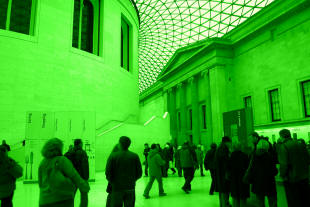


Rule 4: The first time we talk about it, we use a(n). The second time, we use the.
Task 10:
 |
We now have 4 rules. Can you
write them with an example for each one? Don't look back! Click here when you have written the 4 rules. |
|
|
ELT Concourse for learners of English |

 |
To start
you thinking: What's your first language?
|
Many languages do not use articles at all.
Many languages use articles very differently from English.
That's why we have this lesson.
 |
write |
Task 1: translate this into your language.
I gave him a cup. He put the cup down.
Does your language make a difference between a cup and the cup?
Task 2: translate this into your language.
I gave him some sugar. He put the sugar in his tea.
Does your language make a difference between some sugar and the sugar?
No
differences? Your language probably does not have
articles.
Some differences? Your language
has some articles.
Four differences? Your language has articles.
 |
Now look at this and think: Why? |
 |
|
We say a blue pencil but we say
the black pencil.
Why?
Click here when you have an answer.
The answer
is:
There is ONLY ONE
black pencil. We know which pencil it is.
There are THREE
blue pencils. It does not matter which pencil you give me.
Rule 1: When there is only one of something, we usually say the.
Task 4: Right or Wrong? Click on the
![]() when you
want the answer.
when you
want the answer.
 Give me a grey pen, please. |
Wrong.
There is only ONE grey pen so the we say: Give me the grey pen, please. |
 He drives a red car. |
Right.
There are LOTS OF red cars. We don't know which car he drives. |
 His car is the yellow one. |
Right.
There is only ONE yellow car in the picture. We know which car is his car. |
 Take a blue bag. |
Wrong.
There's only one blue bag in the picture. We say Take the blue bag. |
 The lion is very tired |
Right.
There is only ONE tired lion. |
 Pass me a red book. |
Wrong.
There is only one red book. We say: Pass me the red book. |
 |
think: What is the difference? |
|
In sentence 1., there is more than one
manager.
In sentence 2., there is only one manager. |
|
In sentence 1., it is not important which park.
In sentence 2., we both know the park. |
|
In sentence 1., I don't know which policeman.
Perhaps there are lots of policemen. In sentence 2., we both know the policeman. |
|
In sentence 1., there are lots of aspirins.
In sentence 2., there was only one aspirin. |
|
In sentence 1., his job is a teacher.
I don't know what he teaches. In sentence 2., I know him and I know the class he teaches. |
 |
Look at these |
 |
 |
Would you like a biscuit and some sugar? |
 |
 |
I have a pen and some paper with me. |
 |
I found a wallet with some money in it. | |
I can count biscuits: 1 biscuit, 2
biscuits etc.
I can't count sugar.
I can count pens: 1 pen, 10 pens
etc.
I can't count paper (but I can count
pages).
I can count wallets: 1 wallet, 6
wallets etc.
I can't count money (but I can count
dollars, pounds, Euros etc.).
Rule 2: When we can't count it, we use some.
Task 7:
 |
Now look at these |
 |
 |
There are
some
books on the floor. There is some sugar in the bowl. |
 |
 |
I have some pencils and some paper. |
Rule 3: When we can count it and have more than one, we use some.
Task 8: Take a test.
Task 9:
 |
Now read this Why do we use a and the in this story? |
A red car stopped and the
driver opened the window.
"I'm a tourist here and I'm lost," he said.
"Is there a petrol station near here?"
"I don't know," I said, "I'm a tourist too!"
"Oh. I need some petrol badly," the driver
said. "The car is nearly empty."
A police officer came to the car.
"You can't park here, sir." said the officer.
"I don't want to park the car," the
driver said. "I need some petrol. Is
there a petrol station in the
town?"
"Yes," said the police officer. "There is one
in the next street on the left."
Click here when you have an answer.



Rule 4: The first time we talk about it, we use a(n). The second time, we use the.
Task 10:
 |
We now have 4 rules. Can you
write them with an example for each one? Don't look back! Click here when you have written the 4 rules. |
 |
Now look out of your window. What can you see? Make sentences like these: |
Make 5 sentences.
Task 12: Take the last test.